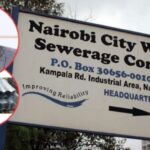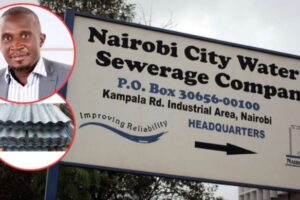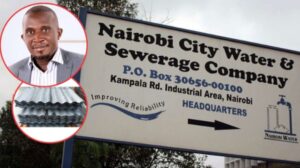Former KEMSA Chairman Irungu Nyakera has garnered attention over the years for his involvement in contentious activities, balancing a career in public service with a brief political stint as head of the relatively unknown Farmers Party.
His unsuccessful bid for the Murang’a gubernatorial position was followed by an ongoing series of allegations, which seem to include a recent scheme concerning plots at Thika Greens.
An anonymous seller shared their experience of working with Nyakera, revealing that they had sold over 15 plots for him since January, each valued at approximately KSh 8 million.
They were initially promised a 3% commission to be paid by August.
However, upon inquiring about their payment, Nyakera reportedly declined, asserting that no official agreement had been established regarding commissions.
Despite numerous follow-up attempts, the seller claims Nyakera instructed them to stop reaching out and subsequently blocked them on all communication platforms.
Attempts to communicate via email were also unsuccessful, though the seller kept copies of all correspondence as evidence.
Nyakera later contacted them with a suggestion to continue working as a freelancer, a proposal the seller saw as another ploy.
According to the seller, not only have they been unable to secure the promised commission, but clients seeking to recover their deposits have also been allegedly ignored by Nyakera, leaving the seller feeling exploited and frustrated a sentiment they say reflects a recurring issue in Nyakera’s history.
Just as during his KEMSA days, Nyakera’s actions suggest a pattern of leveraging his roles for personal advantage.
Nyakera’s reputation within KEMSA was marred by controversies, with allegations of prioritizing personal gain over organizational integrity.
Reports indicate that Nyakera granted lucrative contracts to firms associated with his political allies, especially within Murang’a County.
These activities were part of broader criticisms of KEMSA’s management, painting a troubling picture of a public figure who seemingly put self-interest first.
In addition, accusations of unauthorized hires during his time at KEMSA came to light, with reports of Nyakera allegedly appointing individuals to well-compensated roles without going through established hiring procedures.
These actions contributed to KEMSA’s financial strain, prompting the Ethics and Anti-Corruption Commission (EACC) to investigate.
Under Nyakera, KEMSA also faced scrutiny for its procurement practices, operating without a formal supplier list and bypassing standard protocols.
Nyakera’s public image took another hit following a highly publicized family dispute in July 2022, during which he and his sister argued over land ownership a confrontation that was recorded and widely shared online.
This incident raised further concerns about his behavior and reputation.
As criticism over his KEMSA tenure mounted, public outcry for his removal intensified, leading to his eventual dismissal on August 23, 2024.
However, despite his exit from KEMSA, Nyakera’s deep-rooted political connections helped him secure a new position as chair of the Kenyatta International Convention Centre (KICC), demonstrating the enduring influence of political patronage in Kenya.
In his role at KICC, Nyakera’s strategic position continues to provide him with significant access to influential networks, intertwining his professional and personal interests.
This blending of business and politics has created an environment that some see as conducive to the misuse of authority.
Among the numerous allegations tied to Nyakera, the Samara Housing Project stands out as one of the more prominent.
Launched in 2020 in Kiambu County, this housing project gained substantial attention as a government-endorsed affordable housing initiative, promising competitively priced two- and three-bedroom apartments through the State Department for Housing and Urban Development, led by Principal Secretary Charles Hinga.
The project attracted hopeful investors with the promise of high-quality, affordable housing options, but eventually left many disappointed when construction stalled.
Buyers, who had placed large deposits often around 40% of the total unit cost with Sycamore Pine Limited, Nyakera’s company, faced unanticipated delays.
Requests for updates and refunds were met with vague responses, and many investors found themselves unable to reach Nyakera or his representatives.
Efforts to contact Nyakera directly were reportedly unsuccessful, with those affected left disillusioned by what they described as broken promises and ongoing frustrations.
If you’re interested in a deeper dive into Nyakera’s involvement in the Samara Housing Project and its impact on investors, we’ve covered that topic previously.





















Add Comment